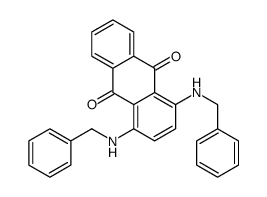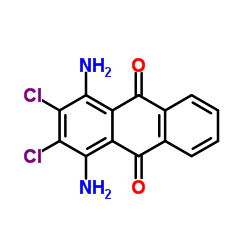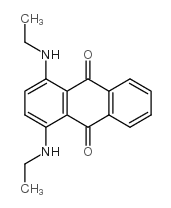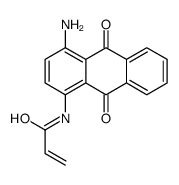128-95-0
| 中文名 | 1,4-二氨基蒽醌 |
|---|---|
| 英文名 | 1,4-Diaminoanthraquinone |
| 中文别名 |
蒽醌-1,4-二胺
苏丹紫 1,4-二氨基-9,10-蒽二酮 分散紫 1 苏旦紫 分散紫 2R 溶剂紫 ER 杜南醇紫2R C.I.分散紫1 1,4-二胺蒽醌 1:4-二胺蒽醌 |
| 英文别名 |
EINECS 204-922-6
1,4-Diaminoanthraquinone MFCD00001224 1,4-Diaminoanthracene-9,10-dione 1,4-Diamino anthraquinone 1,4-Diamino-9,10-anthraquinone |
| 密度 | 1.5±0.1 g/cm3 |
|---|---|
| 沸点 | 544.2±50.0 °C at 760 mmHg |
| 熔点 | 265-269 °C(lit.) |
| 分子式 | C14H10N2O2 |
| 分子量 | 238.241 |
| 闪点 | 282.9±30.1 °C |
| 精确质量 | 238.074234 |
| PSA | 86.18000 |
| LogP | 2.98 |
| 外观性状 | 紫罗兰色粉末 |
| 蒸汽压 | 0.0±1.5 mmHg at 25°C |
| 折射率 | 1.757 |
| 储存条件 | 用铁桶内衬塑料袋包装,每桶净重50kg。贮存于通风处,防晒、防潮。 |
| 稳定性 | 1.基本性质 深紫色针状结晶。熔点268℃。溶于乙醇、苯和硝基苯,微溶于水和热乙酸。 2.人体LD1~2g/kg。大鼠腹腔注射LD100500mg/kg。参见1,5-二氨基蒽醌。 |
| 分子结构 | 1、 摩尔折射率:67.14 2、 摩尔体积(cm3/mol):163.6 3、 等张比容(90.2K):490.7 4、 表面张力(dyne/cm):80.9 5、 极化率(10-24cm3):26.61 |
| 计算化学 | 1.疏水参数计算参考值(XlogP):2.6 2.氢键供体数量:2 3.氢键受体数量:4 4.可旋转化学键数量:0 5.互变异构体数量:8 6.拓扑分子极性表面积86.2 7.重原子数量:18 8.表面电荷:0 9.复杂度:346 10.同位素原子数量:0 11.确定原子立构中心数量:0 12.不确定原子立构中心数量:0 13.确定化学键立构中心数量:0 14.不确定化学键立构中心数量:0 15.共价键单元数量:1 |
| 更多 | 1. 性状:深紫色结晶(在吡啶中)或紫色结晶。 2. 熔点(℃):268 3. 溶解性:溶于苯、吡啶、硝基苯、苯胺,稍溶于热醋酸、乙醇。在浓硫酸中溶液几乎无色,加硼酸后显蓝红色。 |
|
SECTION 1: Identification of the substance/mixture and of the company/undertaking Product identifiers Product name: 1,4-Diaminoanthraquinone REACH No.: A registration number is not available for this substance as the substance or its uses are exempted from registration, the annual tonnage does not require a registration or the registration is envisaged for a later registration deadline.
CAS-No.: 128-95-0 Relevant identified uses of the substance or mixture and uses advised against Identified uses: Laboratory chemicals, Manufacture of substances SECTION 2: Hazards identification Classification of the substance or mixture Not a hazardous substance or mixture according to Regulation (EC) No. 1272/2008. This substance is not classified as dangerous according to Directive 67/548/EEC. Label elements The product does not need to be labelled in accordance with EC directives or respective national laws. Other hazards This substance/mixture contains no components considered to be either persistent, bioaccumulative and toxic (PBT), or very persistent and very bioaccumulative (vPvB) at levels of 0.1% or higher. SECTION 3: Composition/information on ingredients Substances Formula: C14H10N2O2 Molecular weight: 238,24 g/mol CAS-No.: 128-95-0 EC-No.: 204-922-6 No components need to be disclosed according to the applicable regulations. SECTION 4: First aid measures Description of first aid measures If inhaled If breathed in, move person into fresh air. If not breathing, give artificial respiration. In case of skin contact Wash off with soap and plenty of water. In case of eye contact Flush eyes with water as a precaution. If swallowed Never give anything by mouth to an unconscious person. Rinse mouth with water. Most important symptoms and effects, both acute and delayed The most important known symptoms and effects are described in the labelling (see section 2.2) and/or in section 11 Indication of any immediate medical attention and special treatment needed No data available SECTION 5: Firefighting measures Extinguishing media Suitable extinguishing media Use water spray, alcohol-resistant foam, dry chemical or carbon dioxide. Special hazards arising from the substance or mixture Carbon oxides, Nitrogen oxides (NOx) Advice for firefighters Wear self-contained breathing apparatus for firefighting if necessary. Further information No data available SECTION 6: Accidental release measures Personal precautions, protective equipment and emergency procedures Avoid dust formation. Avoid breathing vapours, mist or gas. For personal protection see section 8. Environmental precautions No special environmental precautions required. Methods and materials for containment and cleaning up Sweep up and shovel. Keep in suitable, closed containers for disposal. Reference to other sections For disposal see section 13. SECTION 7: Handling and storage Precautions for safe handling Provide appropriate exhaust ventilation at places where dust is formed. For precautions see section 2.2. Conditions for safe storage, including any incompatibilities Store in cool place. Keep container tightly closed in a dry and well-ventilated place. Storage class (TRGS 510): Non Combustible Solids Specific end use(s) Apart from the uses mentioned in section 1.2 no other specific uses are stipulated SECTION 8: Exposure controls/personal protection Control parameters Components with workplace control parameters Exposure controls Appropriate engineering controls General industrial hygiene practice. Personal protective equipment Eye/face protection Use equipment for eye protection tested and approved under appropriate government standards such as NIOSH (US) or EN 166(EU). Skin protection Handle with gloves. Gloves must be inspected prior to use. Use proper glove removal technique (without touching glove's outer surface) to avoid skin contact with this product. Dispose of contaminated gloves after use in accordance with applicable laws and good laboratory practices. Wash and dry hands. The selected protective gloves have to satisfy the specifications of EU Directive 89/686/EEC and the standard EN 374 derived from it. Body Protection Choose body protection in relation to its type, to the concentration and amount of dangerous substances, and to the specific work-place., The type of protective equipment must be selected according to the concentration and amount of the dangerous substance at the specific workplace. Respiratory protection Respiratory protection is not required. Where protection from nuisance levels of dusts are desired, use type N95 (US) or type P1 (EN 143) dust masks. Use respirators and components tested and approved under appropriate government standards such as NIOSH (US) or CEN (EU). Control of environmental exposure No special environmental precautions required. SECTION 9: Physical and chemical properties Information on basic physical and chemical properties a) AppearanceForm: solid Colour: dark violet b) OdourNo data available c) Odour ThresholdNo data available d) pHNo data available e) Melting point/freezingMelting point/range: 265 - 269 °C point f) Initial boiling point and No data available boiling range g) Flash point340,00 °C - closed cup h) Evaporation rateNo data available i) Flammability (solid, gas) No data available j) Upper/lowerNo data available flammability or explosive limits k) Vapour pressureNo data available l) Vapour densityNo data available m) Relative densityNo data available n) Water solubilityNo data available o) Partition coefficient: n- No data available octanol/water p) Auto-ignitionNo data available temperature q) DecompositionNo data available temperature r) ViscosityNo data available s) Explosive propertiesNo data available t) Oxidizing propertiesNo data available Other safety information No data available SECTION 10: Stability and reactivity Reactivity No data available Chemical stability Stable under recommended storage conditions. Possibility of hazardous reactions No data available Conditions to avoid No data available Incompatible materials Strong oxidizing agents Hazardous decomposition products Other decomposition products - No data available In the event of fire: see section 5 SECTION 11: Toxicological information Information on toxicological effects Acute toxicity LD50 Oral - Rat - 5.790 mg/kg Skin corrosion/irritation Serious eye damage/eye irritation Eyes - Rabbit Result: Mild eye irritation - 24 h Respiratory or skin sensitisation No data available Germ cell mutagenicity Carcinogenicity IARC:No component of this product present at levels greater than or equal to 0.1% is identified as probable, possible or confirmed human carcinogen by IARC. Reproductive toxicity Specific target organ toxicity - single exposure Specific target organ toxicity - repeated exposure Aspiration hazard Additional Information RTECS: CB6300000 To the best of our knowledge, the chemical, physical, and toxicological properties have not been thoroughly investigated. SECTION 12: Ecological information Toxicity No data available Persistence and degradability No data available Bioaccumulative potential Mobility in soil Results of PBT and vPvB assessment This substance/mixture contains no components considered to be either persistent, bioaccumulative and toxic (PBT), or very persistent and very bioaccumulative (vPvB) at levels of 0.1% or higher. Other adverse effects No data available SECTION 13: Disposal considerations Waste treatment methods Product Offer surplus and non-recyclable solutions to a licensed disposal company. Contaminated packaging Dispose of as unused product. SECTION 14: Transport information UN number ADR/RID: -IMDG: -IATA: - UN proper shipping name ADR/RID: Not dangerous goods IMDG: Not dangerous goods IATA:Not dangerous goods Transport hazard class(es) ADR/RID: -IMDG: -IATA: - Packaging group ADR/RID: -IMDG: -IATA: - Environmental hazards ADR/RID: noIMDG Marine pollutant: noIATA: no Special precautions for user No data available SECTION 15: Regulatory information This safety datasheet complies with the requirements of Regulation (EC) No. 1907/2006. Safety, health and environmental regulations/legislation specific for the substance or mixture No data available Chemical Safety Assessment For this product a chemical safety assessment was not carried out SECTION 16: Other information Further information Copyright 2014 Co. LLC. License granted to make unlimited paper copies for internal use only. The above information is believed to be correct but does not purport to be all inclusive and shall be used only as a guide. The information in this document is based on the present state of our knowledge and is applicable to the product with regard to appropriate safety precautions. It does not represent any guarantee of the properties of the product. Corporation and its Affiliates shall not be held liable for any damage resulting from handling or from contact with the above product. See and/or the reverse side of invoice or packing slip for additional terms and conditions of sale. |
|
毒理学数据: 1、皮肤/眼睛刺激:兔子眼睛标准德雷兹染眼实验:500mg/24H 对眼睛有轻微的刺激作用。 2、急性毒性:大鼠经口LD5O:5790mg/kg 大鼠经腹膜LD5O:250mg/kg 3、致突变:沙门氏菌基因突变测试系统:100ug/plate 微生物基因突变测试系统:12800ug/L CHEMICAL IDENTIFICATION
HEALTH HAZARD DATAACUTE TOXICITY DATA
MUTATION DATA
|
| 个人防护装备 | Eyeshields;Gloves;type N95 (US);type P1 (EN143) respirator filter |
|---|---|
| 危害码 (欧洲) | Xi |
| 风险声明 (欧洲) | R22 |
| 安全声明 (欧洲) | S22-S36/37 |
| 危险品运输编码 | NONH for all modes of transport |
| WGK德国 | 2 |
| RTECS号 | CB6300000 |
| 海关编码 | 2922399090 |
| 上游产品 10 | |
|---|---|
| 下游产品 10 | |
| 海关编码 | 2922399090 |
|---|---|
| 中文概述 | 2922399090 其他氨基醛、氨基酮及其盐(包括氨基醌及其盐,但含有一种以上含氧基的除外). 增值税率:17.0% 退税率:9.0% 监管条件:无 最惠国关税:6.5% 普通关税:30.0% |
| 申报要素 | 品名, 成分含量, 用途, 乙醇胺及其盐应报明色度, 乙醇胺及其盐应报明包装 |
| Summary | 2922399090 other amino-aldehydes, amino-ketones and amino-quinones, other than those containing more than one kind of oxygen function; salts thereof VAT:17.0% Tax rebate rate:9.0% Supervision conditions:none MFN tariff:6.5% General tariff:30.0% |




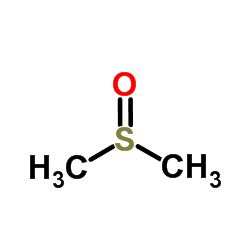

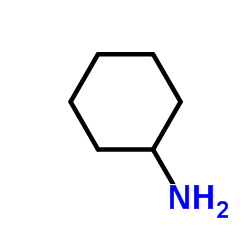

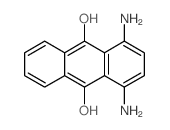
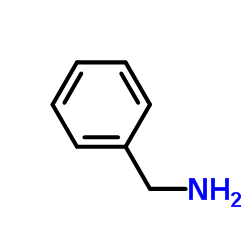
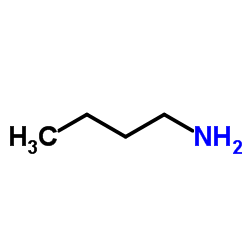
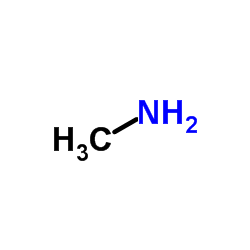
![5-diethylaminoanthra[1,9-c,d]isoxazol-6-one结构式](https://image.chemsrc.com/caspic/285/83206-62-6.png)
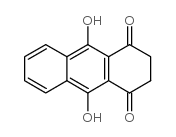
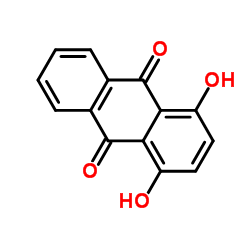
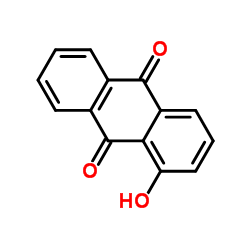
![6-amino-7H-benzo[e]perimidin-7-one结构式](https://image.chemsrc.com/caspic/395/3044-04-0.png)
